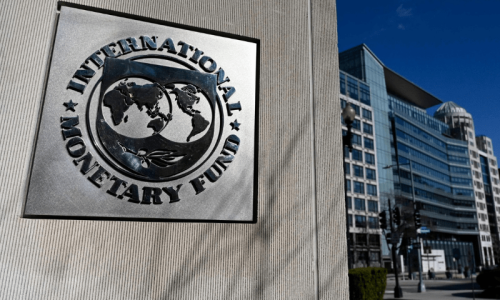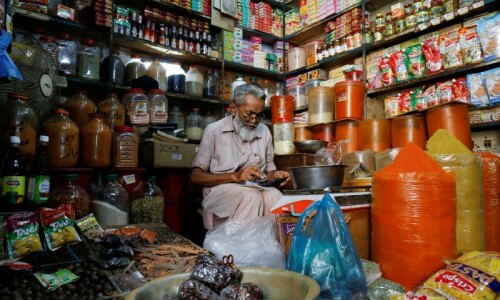The budget for the new fiscal year sailed through the National Assembly (NA) on Sunday, a day after the government made several changes, including fiscal tightening measures, dictated by the International Monetary Fund (IMF) in a last-ditch effort to secure critical funding.
The revised budget aims for an additional Rs215 billion in tax revenue alongside a cutback of Rs85 billion in public spending for the upcoming fiscal year. However, this does not affect the federal development budget or the salaries and pensions of government personnel.
The Rs14.48 trillion budget was passed during a session that lacked quorum, with only 70 lawmakers on the treasury benches and two on the opposition benches. Foreign Minister Bilawal Bhutto-Zardari, his father Asif Ali Zardari and the leader of the opposition, Raja Riaz, were also absent.
At the outset of the session, Finance Minister Ishaq Dar had defended the government’s move to implement various reforms in the pensions scheme.
“If someone has a job on a contract then he will have to choose between the two pensions. This should’ve been corrected a long time ago,” he said. “It is a matter of principle that you have the right to one pension.”
He said that when a pensioner died, their widowed spouse would receive the stipend. But once the spouse died, their dependents would get the pension for 10 years after which it will end, he said.
“Our pension bill went to Rs800bn in this budget. It is a huge amount. It used to be half a few years ago,” Dar said, adding that these reforms were the need of the time.
During the session, Jamaat-i-Islami lawmaker Maulana Abdul Akbar Chitrali moved a resolution to send the budget to the Council of Islamic Ideology (CII). He contended that the budget was based on a “system of interest”, adding that by accepting it the government was going against the directives of the Federal Shariat Court (FSC).
“Not taking the CII’s opinion on the finance bill will be a violation of the FSC’s decision,” he said.
Ayaz Sadiq opposed the move, saying that parliamentarians had to go for Haj and called for wrapping up budget proceedings. The NA speaker put the resolution up for vote after which the the resolution was rejected.
The finance minister then presented the budget for the new fiscal year with amendments for clause by clause approval. Chitrali’s proposed amendment was also accepted, under which the chairman of standing committees would be allowed cars up to 1,200cc.
Rs215bn in new taxes
Under the changes in the budget, the government now aims to generate another Rs215 billion in taxes and cut spending by Rs85bn in the next fiscal year, without reducing the federal development budget or the salaries and pensions of government employees.
This will revise the government’s revenue collection target to Rs9.415 trillion and put total spending at Rs14.48tr. The share of the provinces would be increased to Rs5.39tr from Rs5.28tr.
The allocation for the Benazir Income Support Programme has also been revised from Rs450bn to Rs466bn for FY24. Besides, the petroleum development levy will be raised from Rs50 to Rs60 per litre.
The changes in the budget came a day after Prime Minister Shehbaz Sharif met IMF Managing Director Kristalina Georgieva on the sidelines of the Global Financing Summit in Paris.
The Fund’s ongoing loan programme agreed in 2019 is set to expire on June 30. Under the $6.5bn facility’s ninth review, negotiated earlier this year, the country has been trying to secure $1.1bn of funding stalled since November.
When Dar presented the budget on June 9, he announced new revenue measures of Rs223bn in addition to all taxes worth Rs500bn introduced in a mini-budget in mid-February. The sum of new tax measures for the coming fiscal year now stands at Rs938bn.
The government hopes to achieve a 28pc higher revenue target for the next fiscal year based on projected economic growth of 3.5pc, average inflation of 21pc and revenue measures.
The autonomous growth in revenue — to come from GDP growth and inflation — is projected at Rs1.76tr in the next fiscal year.















































Dear visitor, the comments section is undergoing an overhaul and will return soon.